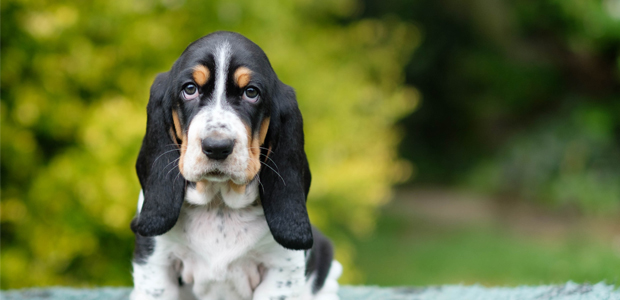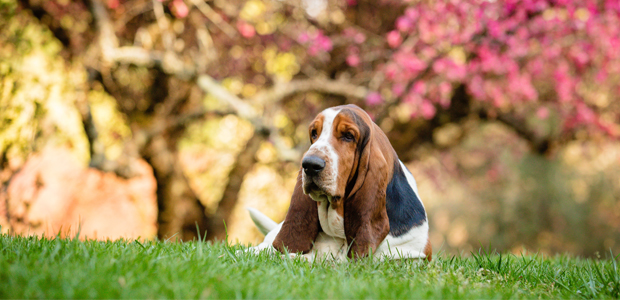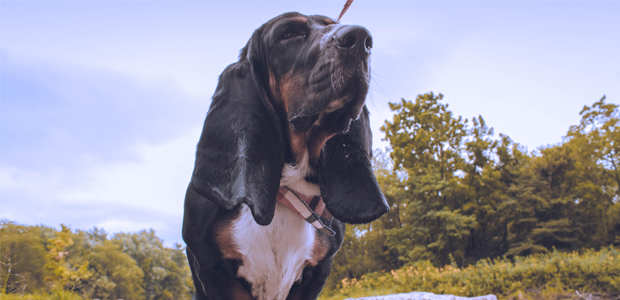The Basset Hound: is it the right breed for you?
Basset Hounds are calm yet playful dogs that love to show affection to their owners.
They are instantly recognizable because of their floppy ears, droopy face and short legs.
Originally bred for hunting small animals and game, these relaxed dogs are surprisingly energetic.
Basset Hound summary:
- Scent hounds with a history of hunting
- Their short coat tends to be tricolour (black brown & white) or bicolour (lemon & white)
- Average size = 32 - 38 cm
- Average weight = 18 - 25 kg
- Basset Hound Life expectancy = 10 - 12 years
- Estimated monthly cost = Medium
- Exercise needs = Medium
- Attention needs = High
- Sociability = Medium
Please note: A dog’s exercise, training/stimulation and grooming requirements can depend on several factors such as age and health. The same goes for ongoing costs of ownership. For advice on one specific dog, we always advise chatting with a vet.
How much exercise does a Basset Hound need?
Although they will happily lounge about all day, Basset Hounds need plenty of exercise. They can become bored if they don’t get enough physical & mental stimulation. They’ll require at least 1 hour of physical activity a day to ensure that their exercise needs are met.
Due to their long bodies and relatively short legs, striking the right balance between activity and rest is key to keeping your Basset Hound happy and healthy. Hour-long walks will help them to stay at a healthy weight, as putting on too many pounds can put pressure on their backs.
Whilst they are still growing and their joints are not yet fully developed, they should be stopped from climbing stairs.
To keep them happy and healthy, take them to a secure environment where they can run off-lead, with lots of interesting things to see and sniff. As with all breeds, be careful not to over-exercise them whilst they are still growing, as this can have long term effects on their joints.
As well as outdoor activities, Basset Hounds need to stay mentally stimulated with training and puzzle games.
Basset Hound dietary requirements
Your Basset Hound will need a balanced diet rich in nutrients, vitamins, and minerals. It’s best to feed them specially formulated complete dog food to ensure that they are getting the right amount of vitamins and nutrients.
Growing pups may prefer 3-4 smaller servings during the day, rather than two larger meals. This can be reduced to two meals a day as your dog gets older.
The recommended portion size will depend on your individual dog. You’ll need to take into account their activity level, age and metabolism. To avoid weight gain, make sure your Basset Hound has a healthy and balanced diet and gets plenty of exercise.
Training: how to train a Basset Hound
Basset Hounds are intelligent dogs although they can treat training with a degree of contempt.
With willingness and patience, your Basset will respond to training. They are more than partial to treats, so plenty of positive reinforcement will help them to get the hang of things.
Because of their scent hound genetics, it’s important that your Basset is trained to walk on a lead. When they pick up an interesting scent, it’s all they can focus on and they will more than likely ignore your commands. Keeping them on a lead is key to keeping them safe when you’re out for a walk.
As is the case with all breeds, Basset Hounds will start to approach new experiences with caution when they are around 12 weeks old. Therefore, it’s really important for their development that they experience as many different situations as possible.
Grooming: do Basset Hounds shed?
Basset Hounds are low maintenance when it comes to grooming. Thanks to their short coat, a quick brush once a week will suffice. You should only need to bathe your Bassets when they get muddy.
Complete your Basset Hounds grooming routine with regular tooth brushing, nail clips and ear checks.

Cost of owning a Basset Hound
When considering the lifetime cost of owning a Basset Hound, remember to take into account the following costs:
- Breed-specific food
- Veterinary care
- Pet insurance
- Kennels or dog sitters
- Regular grooming costs
- Toys and equipment
- Preventative healthcare
As a rough guide, allow between £80 and £100 a month to cover the ongoing costs of owning a Basset Hound. Our vets have drawn up this handy guide to save dog owners money.
Are Basset Hounds prone to any health problems?
Basset Hounds are prone to certain health problems, just like all breeds. This doesn’t mean your dog is guaranteed to contract any particular disease – it’s just something to bear in mind.
To keep your Basset Hound as healthy as possible, monitor them closely and attend routine 6-month health checks with your vet. This will allow the vet to give your dog a thorough check-up and to pick up on minor (often symptomless) conditions before they have a chance to escalate into something worse.
Possible health complications for Basset Hound include:
- Dental issues and gum disease
- Infections
- Obesity and weight problems
- Allergies (including flea, food and pollen)
- Hip dysplasia
- Intervertebral Disc Disease (a condition that affects the dog’s back)
Before welcoming a new dog into your household, make sure you’re able to cover the costs of any routine or emergency medical treatment they may need. Pet insurance will help massively with this. Why not ask your vet about their recommended pet insurance policy?
Basset Hound temperament, socialising and ideal home environment
Basset Hounds make for great family pets and are known for their curious nature and sense of humour. They love human interaction and usually get on well with other pets if they are introduced to them from a young age.
Ideally, they need to be near rural areas so they can go on walks and use their nose to sniff out scents. They are comfortable in most houses if they have gardens, and single story homes, such as bungalows or garden flats, are ideal for Bassets.
Be careful around water as their small legs and dense bodies mean that they aren’t natural swimmers.
Basset Hounds love to spend time with people and love nothing more than a good pat on the head. They have been known to be quite noisy and barking can become a problem. Read our top tips on how to deal with barking.
Affectionate dogs that form strong bonds with their owners, Basset Hounds can be prone to developing separation anxiety. It’s good practice to leave them on their own for small periods during training so that they can get used to being by themselves.

Are Basset Hounds suitable for first time owners?
Basset Hounds may not be the easiest companion, especially if you’re a first-time pet owner. They’re intelligent and stocky dogs that can quickly become a handful if they’re not properly stimulated and socialised.
They need attention and exercise, so if you’re out of the house for most of the day, then they might not be the most suitable breed for you.
That said, if you’re able to give them the time and attention they need, as well as putting the hours in when it comes to training, there’s no reason for a Basset Hound not to be your ideal pet. If you have done your research beforehand, owning a Basset Hound can be an enjoyable and rewarding experience.
Need more info?
For more info on finding the best dog breed for you and your lifestyle, have a chat with your vet. Find your nearest vet using our Find a Vet page.


